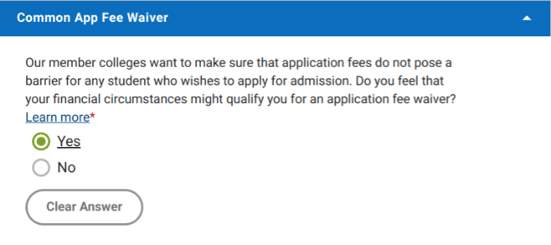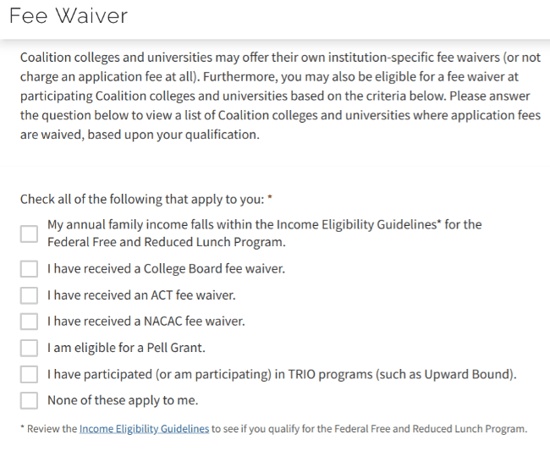
Most college application fees fall in the $40 to $50 range, with some costing as much as $90 (ahem, Stanford). For many students and their families, these fees present a serious obstacle along the already pricey path to college. If application fees are burdensome to you, you might qualify for college application fee waivers.
Just like SAT and ACT fee waivers, these college fee waivers allow you to send off your applications for free. This guide will go over how you can qualify for and use college application fee waivers; it'll also review how much college apps usually cost and how much you can save with fee waivers.
Here's the information we're going to be covering:
- How Much Do College Applications Cost?
- How to Qualify for College Application Fee Waivers
- How Do You Get College Application Fee Waivers?
- How Do You Use College Application Fee Waivers?
This article is pretty hefty, so you might want to read through a few sections at a time and keep it bookmarked to use a reference, rather than trying to plow all the way through!
How Much Do College Applications Cost?
College applications cost, on average, around $50. Especially selective schools, such as NYU, Boston University, Harvard, Yale, and of course the pricey Stanford, ask for $75 or more. If you apply to just five of these expensive private schools, then you're already looking at application fees of more than $375!
Some public schools are less expensive; University of Arkansas and Michigan State University both have application fees of $40. Other schools are even cheaper with application fees of just $25 or $30. There's also a good number of schools to which you can apply for free!
But unless you're applying to primarily fee-free schools, the costs of applying can seriously add up, especially if you're looking at eight or more colleges.
Fee waivers can be a huge help, but they aren't available to everyone. Generally, fee waivers are only given to students and families who qualify. This can include international students as well. Read on to learn whether you're eligible!
How to Qualify for College Application Fee Waivers
First off, it merits saying that your fee waivers are actually fee waiver requests. Ultimately, each of your colleges must approve your request. For the most part, colleges will approve them if you have your school counselor's or another designated official's signature.
If your colleges have any doubts or questions, they might ask you to send along extra information demonstrating that you qualify—but this is rare. Mostly, this fee waiver process is done on the honor system. It's up to you and your counselor to determine whether you're eligible, so be sure to take a look at the criteria below.
There are a few criteria that must apply for you to be eligible for fee waivers. They're actually the same guidelines that apply to getting an SAT or ACT fee waiver. If you already got an SAT or ACT fee waiver, you should automatically be eligible for college application fee waivers. If you're using the Common Application and/or the Coalition Application, or your admission test of choice was the SAT, then the process should be especially easy.
Let's go over the qualifying guidelines. If any one of the following is true for you, then you qualify for an application fee waiver:
- You're enrolled in or eligible for the Federal Free or Reduced Price Lunch program
- Your family income meets the Income Eligibility Guidelines set by the USDA Food and Nutrition Service*
- You're enrolled in a program that aids students from low-income families, such as Upward Bound
- Your family receives public assistance
- You live in federally subsidized public housing or a foster home, or you are homeless
- You're a ward of the state or an orphan
*For most states, the Income Eligibility Guidelines are as follows:
| Members in Household | Total Annual Income |
| 1 | $26,973 |
| 2 | $36,482 |
| 3 | $45,991 |
| 4 | $55,500 |
| 5 | $65,009 |
| 6 | $74,518 |
Note that international students may be eligible for college application fee waivers as well, usually as long as they meet at least one of the criteria above.
So if you already got an SAT or ACT fee waiver or are eligible based on the criteria listed above, how do you go about obtaining your college fee waiver?

First, you'll need a shovel, some gloves, and a sturdy pair of shoes ...
How Do You Get College Application Fee Waivers?
The easiest ways to get your hands on application fee waivers don't involve archaeological adventures, unfortunately. Instead, you'll find it fairly simple to get an application fee waiver if:
#1: You're applying to colleges with the Common Application, and/or
#2: You're applying to colleges with the Coalition Application, and/or
#3: You took the SAT with a fee waiver
If none of these scenarios applies to you, then you might be able to get an alternative fee waiver form. (For instance, students who took the ACT and are applying to a non-Common App and non-Coalition App school might need to find these other forms.) If you have trouble obtaining any form at all, you can simply fax, mail, or email your college a letter of request.
Since there are a few different options, we'll break it down with instructions for each scenario, starting with students who apply through the Common Application.
Scenario 1: You're Using the Common Application
The Common App streamlines the application process in a number of ways, one of which is asking for fee waivers. You can request fee waivers from any of your Common App schools!
To obtain a Common App fee waiver, you have to meet the same requirements as those described above. In your Profile section, you'll indicate whether or not you qualify for a fee waiver, and then you'll select your reason why. The screen will look like this:

If you select yes, you'll be prompted to select an indicator of economic need:
You'll electronically sign this section and receive the above reminder that your counselor will need to confirm your answer. If you already got an SAT or ACT fee waiver, then your counselor should be able to sign off on this automatically. If not, you might have to provide proof to your counselor that you qualify.
International students follow the same steps listed above. Be aware, however, that it's ultimately up to the school to decide whether they will accept your request for a waiver.
As previously mentioned, many schools use the honor system. As long as your counselor approves, you should be all set. If, for some reason, your school wants to see proof or has decided to deny your fee waiver request (this is rare!), they will contact you. If you don't hear from them, then everything should be good to go.
If your schools request a hard copy, they might accept a number of forms. The easiest would be a College Board fee waiver form, which you'll get automatically if you already took the SAT with a fee waiver. If you didn't, you can access other similar forms. I'll describe the different options below, starting with the College Board's application fee waivers.
Scenario 2: You're Using the Coalition Application
Like the Common Application, the Coalition Application streamlines the college fee waiver process to make it easier for you to get one each time you apply to a school.
To qualify for a fee waiver, you need to answer "yes" to at least one of the "Fee Waiver" questions, which are located in the "Profile" section of your MyCoalition account (and should be filled out as you make your account).
Here's the page and questions you'll see:

After you check off the boxes that apply to you, you will be shown a list of Coalition App schools that will waive their application fees based on the answer(s) you selected. Here is what this list looks like, for example, when you check off "I am eligible for a Pell Grant" (note that you can scroll through this list of schools):
Once it's been determined that you're eligible for college application fee waivers, nothing more is required of you. Your counselor will receive your request for a fee waiver, and their approval will then be sent to the colleges you apply to through the Coalition App.
After your fee waiver request has been approved, you will just bypass the payment screen each time you apply to a college.
Scenario 3: You Took the SAT With a Fee Waiver
Maybe you need to send proof of your Common App fee waiver eligibility to a college. Or maybe you're applying to a college that doesn't use the Common App or Coalition App. For whatever reason, you need a separate college fee waiver form.
If you took the SAT with a fee waiver, you'll automatically get unlimited college fee waivers from the College Board (as long as the schools allow fee waivers to be used). These college app fee waivers will be available in your College Board account, where you can view them and—should your college request it—print out and send them to your schools.
If you took the SAT as a senior, you'll be able to access these waivers when your scores become available. If you took the SAT as a junior, however, you'll have to wait until the fall of your senior year.
You can also search for schools that accept application fee waivers or download this PDF of all the colleges that accept fee waivers to see whether your schools of interest allow you to use a waiver.
You also might need to use alternative forms if you didn't take the SAT and therefore didn't get any College Board waivers. Let's take a look at what these alternative fee waiver forms are.

Scenario 4: You Need Alternative Fee Waiver Forms
Fortunately, there are a few other forms you can use if you're applying to a school not on the Common App or Coalition App and you didn't get an SAT fee waiver.
You can always call admissions offices and ask for their advice on getting a fee waiver (always recommended, as colleges like to set unique policies). Your first stop, though, should be your high school counselor's office. Your counselor will have these forms so you don't have to go tracking them down yourself. Plus, you'll have to get his or her signature of approval anyway.
There are two main forms your counselor may distribute: the ACT waiver or the NACAC waiver. There used to also be a less common form that was sent directly to qualifying students called the "Realize Your College Potential" waiver. These forms are all pretty similar, but let's break each of them down so you can see where to find them and how to use them.
The ACT, Inc. Fee Waiver
Unlike the College Board, ACT, Inc. doesn't automatically grant its test fee-waiving students application fee waivers. However, it does have a fee waiver program! You can learn about the ACT fee waiver program on the ACT, Inc. website and find a copy of the fee waiver form on page 79 of this ACT User Handbook for Educators.
This form is like most of the others: it asks for your basic information, such as your name, address, and high school, as well as your and your school official's (likely your counselor) signatures. You'll also indicate the college to which you're applying.
While the form doesn't clearly specify, it's probably safe to assume that you should only use this form if you took the ACT and, of course, qualified for an ACT fee waiver. However, you're not limited to this ACT waiver. You should use whichever form your counselor offers or your college requires.
The NACAC Fee Waiver
NACAC provides a useful fee waiver request form and a page of FAQs to help students. It's similar to the Common App page and the ACT waiver: it requires your basic information and asks you to specify an indicator of economic need. You'll also need your counselor or designated school official to sign it. Any student can use this form, regardless of the admission test they took. Just remember that NACAC recommends limiting your use of its fee waiver requests to four colleges.
International students who can justify their economic need can also use the NACAC fee waiver form. To fill out the form correctly, international students should check the “Other Request” box in the Economic Need section of the form and write an explanation of their financial barriers to paying the application fee in the space provided. NACAC provides more information about fee waivers for international students on their FAQ page.

Individual College Fee Waivers
For most students in most scenarios, these forms, or a combination of them, should work to get their application fees waived. However, there are always unique circumstances that stand outside the typical process.
If you still have questions, contact the admissions offices of your prospective colleges. Find out whether they accept fee waivers and whether they prefer a specific form or simply a letter.
Some schools might suggest that you write and then mail, fax, or email a letter of request. Harvard, for instance, accepts Common App waivers, Coalition App waivers, and other waiver forms but also welcomes a personal letter if you can't obtain those forms for some reason:
"We are committed to making the application process accessible for all students. If the admissions application fee presents a hardship for you or your family, the fee will be waived. You can request a fee waiver directly through the Common Application or the Coalition application if you meet their respective indicators of economic need. If you do not meet these indicators, please fill out our Admissions Application Fee Waiver Request Form. This form is only open during the admission application period (August through March 1)."
Regardless of the form you use, the requirements are essentially the same: each form represents a request and usually asks for your basic info, signature, counselor's signature, and an indicator of economic need. Rarely do you have to provide supporting documentation, but you should have it on hand just in case.
Now that you have a sense of which fee waivers to use and how to get them, is there anything else you need to know about how to use them?

Don't worry, many colleges don't even ask to see your fee waiver!
How Do You Use College Application Fee Waivers?
We touched on this briefly, but let's review how to submit application fee waivers whether you're using the Common App, the Coalition App, a College Board waiver, or a different form.
How to Use Common App Fee Waivers
If you're applying through the Common App, all you have to do is indicate that you'll be using a fee waiver on your profile page, as pictured above, and give your reason. Your counselor will then be prompted to approve your request.
Both domestic and international students may apply for fee waivers this way.
If you already got an SAT or ACT fee waiver, you shouldn't have to do anything else since your counselor will have already double-checked your eligibility. If you didn't, then you might need to provide them with some supporting documentation, such as proof of income eligibility.
All Common App schools should accept fee waiver requests. For instance, here's what Cornell says:
"The Common Application will automatically send your fee waiver request to your high school counselor for confirmation. No additional documentation is needed after your counselor has approved your request."
Many colleges share this stance, though they reserve the right to ask for more info if they deem it necessary (more likely to happen if you're an international student).
If your college asks for more information, then you might have to fax or send your fee waiver form or whatever else they ask for.
How to Use Coalition App Fee Waivers
Coalition App fee waivers are pretty easy to use. All you need to do is make a MyCoalition account, go to your "Profile" section, and click "Fee Waiver" (pictured above) to check the boxes that apply to your situation and to determine which Coalition App colleges you can get a fee waiver from.
You don't need to submit documentation or proof of your eligibility, unless on the off chance your counselor won't approve your request without specific documents. If you've already gotten a fee waiver from the College Board or ACT, Inc., you shouldn't need to send in any other forms.
Most, if not all, Coalition App schools should accept fee waiver requests. For example, here's what Notre Dame says about fee waivers on its website:
"Your school counselor will receive notice of your intent to use the Fee Waiver, and will then need to verify that you meet the eligibility criteria outlined by the Common Application or Coalition Application. Once eligibility is confirmed, the Common Application or Coalition Application process will bypass the payment step."
The majority of colleges share this view, but they still have the right to ask for further info or documentation if they feel it's necessary.
How to Use College Board Waivers
Your College Board fee waivers will have a personalized code for you. If you're applying to a school that's not on the Common App or Coalition App, then it will likely ask you to enter this code or upload a scanned copy of your waiver in its online application.
If you used an SAT fee waiver, you should be familiar with this process. SAT registration also involves entering your personalized fee waiver code.
If you're applying by mail or if the college asks for an original hard copy, you'll want to send this signed form along with your application.
How to Use Other Fee Waiver Forms
If you're using an NACAC or ACT, Inc. form for non-Common App and non-Coalition App schools, you won't get a personalized code. In most cases, you'll be asked to upload a scanned copy of the signed form to your application. Again, if you're applying by mail or the school wants an original hard copy, you should mail this form.
If the school needs any more information, it will contact you and let you know. To prepare for this possibility, you should give them a call and ask about the process. A few colleges, like many in the California State system, only accept requests from in-state residents.
There are more than 2,000 colleges that approve fee waiver requests—you just have to figure out how your prospective colleges want you to submit your request.
Everyone's path to college is different. Similarly, there are several different options for requesting application fee waivers, some straightforward and others a little more complicated. To make sure you've got your bases covered, let's summarize the most important things to remember for students who want to waive the fees for applying to college.

What to Remember About College Application Fee Waivers
If and only if you're eligible, you can get your college application fees waived. All these college fee waiver forms constitute requests—ultimately, it's up to your colleges to approve your request.
For most schools, you shouldn't run into any roadblocks. It's probably safe to say most colleges welcome as many applications as they can get. The more applications they receive, the more selective they can appear to be!
The eligibility guidelines are much the same as they are for SAT and ACT fee waivers, with the most common being a certain yearly family income and/or being part of the Federal Free or Reduced Lunch program. If you already got a testing fee waiver, then your counselor can approve your college app request without any further input from you. If not, then you might have to show your counselor documentation that proves your eligibility.
Common Application and Coalition Application schools offer the easiest processes. For schools not on the Common App or Coalition App, you might need to enter your code and/or upload, fax, or mail your College Board, ACT, or NACAC fee waiver forms. A handful of schools only approve in-state residents' requests, so be sure to do the research on your prospective colleges.
If all else fails, simply send a request, signed by yourself and your counselor, to your college. Mail or fax this letter, and if you don't hear back from your college, give them a call and ask whether it was accepted. You might also be able to just email your request if the school allows it.
Hopefully, fee waivers remove any financial hardship standing in the way of your applications to your favorite colleges. Of course, all the colleges to which you apply should be ones you'd really like to attend!
What's Next?
Another huge step in college financial planning has to do with financial aid. Check out this guide that breaks down all the steps you need to take to apply for various kinds of financial aid. You can also learn in-depth about preparing your FAFSA application.
If you're still picking out your colleges, you might be considering tuition cost as a factor. Check out these colleges that offer the best financial aid.
Remember to apply for scholarships as well! Our list of the easiest scholarships to apply for is a great place to start.
Have friends who also need help with test prep? Share this article!

Rebecca graduated with her Master's in Adolescent Counseling from the Harvard Graduate School of Education. She has years of teaching and college counseling experience and is passionate about helping students achieve their goals and improve their well-being. She graduated magna cum laude from Tufts University and scored in the 99th percentile on the SAT.

































 Holly R.
Holly R.